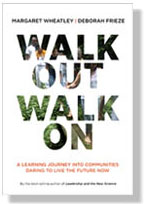
In honor of Charkha Jayanthi (Gandhi’s birthday and the International Day of Nonviolence, celebrated October 2), the Metta community will be spending the next several weeks exploring constructive program through the book Walk Out, Walk On: A Learning Journey into Communities Daring to Live the Future Now by Margaret Wheatley and Deborah Frieze.
Ghandi wanted his birthday to be remembered as Charkha Jayanti (Spinning Wheel Birthday). The spinning wheel was the heart of Gandhi’s constructive programme, and represents the ideals of swadeshi (self-sufficiency and localism) and interdependence. Developing our own knowledge of communities who are embodying these principles, and then reflecting on how we can apply this knowledge in our own communities, is one way that we can pay homage to Gandhi’s life and strive to continue his work.
What does it mean to “walk out”? The authors write:
“Walk Outs are people who bravely choose to leave behind a world of unsolvable problems, scarce resources, limiting beliefs and destructive individualism. They walk on to the ideas, beliefs and practices that enable them to give birth to new systems that serve community. This is the story of an emerging movement of pioneering leaders and communities around the world who are self-organizing to create healthy and resilient communities.”
Each week we will be exploring several chapters of the book and writing a blog post summarizing our reflections on the chapters to spark a conversation with our Walk Out, Walk On learning community. The learning community will then engage in discussion in the comments section of the blog. We hope you will participate, either through following our posts, or reading the book and joining the discussion!
If you would like to join the Walk Out, Walk On learning community, please send an email to education@mettacenter.org expressing your interest. Stay tuned for our first reflection, coming next week!









[…] By Stephanie Knox Cubbon […]